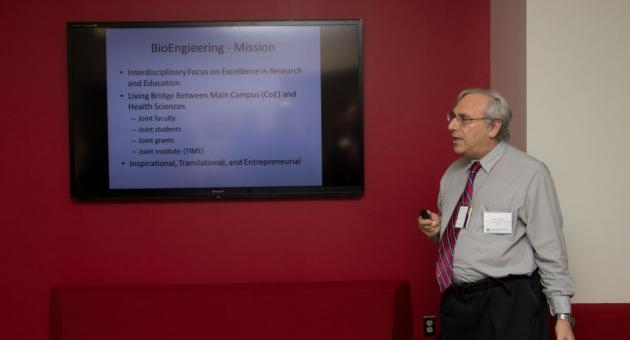Bioengineering program begins at Temple in newly renovated space

Temple University’s College of Engineering gave nearly 50 engineering faculty, staff, students and alumni a sneak peek at its new Bioengineering Department at an informal open house on April 19.
Built in space that formerly housed Temple’s Architecture program, on the eighth and ninth floors of the College of Engineering Building, the newly renovated Bioengineering Department facility offers state-of the art wet and dry research work areas, teaching labs and office space.
“Launching this department has been a challenge that we’ve had for a long time, and finally it has come to fruition,” said College of Engineering Dean Keya Sadeghipour, who has a joint faculty appointment in mechanical engineering and bioengineering.
While the college has offered Ph.D. and master’s degree programs in bioengineering through the mechanical engineering department for several years, a new Bachelor of Science degree in bioengineering has been approved and will be launched by the bioengineering department in the fall of 2013.
“We’re getting to a core number of bioengineering faculty where we can start introducing the undergraduate program,” said Sadeghipour. “It is going to very popular not only as a discipline and for industry, but also as a leader to professional degrees.”
Sadeghipour said that students wanting to go on to medical school, dental school, health professions, business school or even law school will find that bioengineering is an attractive and applicable base degree.
Peter Lelkes, who was recruited to come to Temple in 2011 as the department’s first chair, said he anticipates that the new undergraduate program will attract about 100 students per year to pursue concentrations in biomaterials, tissue engineering, biomechanics, bioimaging and neuroimaging.
“The new department will be multidisciplinary and bring together researchers from across the university,” said Lelkes. “We will be inspirational, translational and entrepreneurial. We feel we are the living bridge between the Main Campus and the health sciences.”
Lelkes said the new department already has four new core faculty members and is hoping to add two or three additional core faculty by the fall. In addition, several engineering faculty as well as faculty from other colleges across the university and Fox Chase Cancer Center will have joint appointments with bioengineering.
The new department has already formed strategic alliances and collaborations with other departments across the university, which have led to joint grant awards for collaborative research.
Lelkes said one of the things that attracted him to Temple was the opportunity to plan and design the new bioengineering department and its facilities, which he characterized as “first rate — second-to-none — in the city and probably the whole northeast region.”
The state-of the-art research open lab space is complemented by cell culture facilities, individual rooms for preparation and microscopy, wet and dry labs and secured areas. “In practical terms, the lab space is very spacious and functional, has ample bench and storage room and has sufficient amperage, which means you can install very large equipment in the facilities,” he said.
Construction of the facilities began in August of last year and took about five months to complete.
Sadeghipour said an official ribbon-cutting for the new department will take place in the near future.